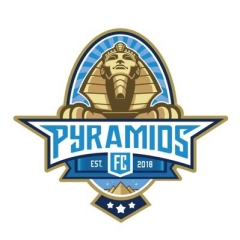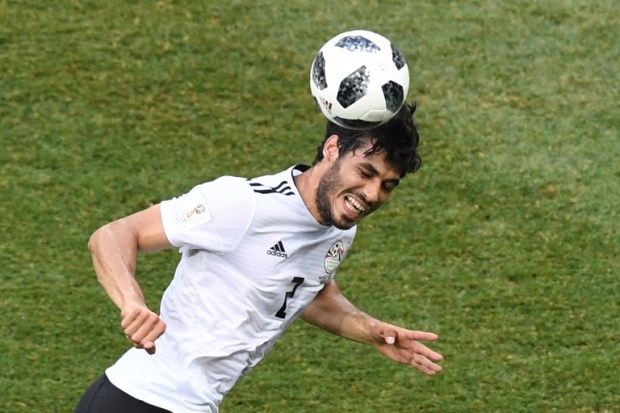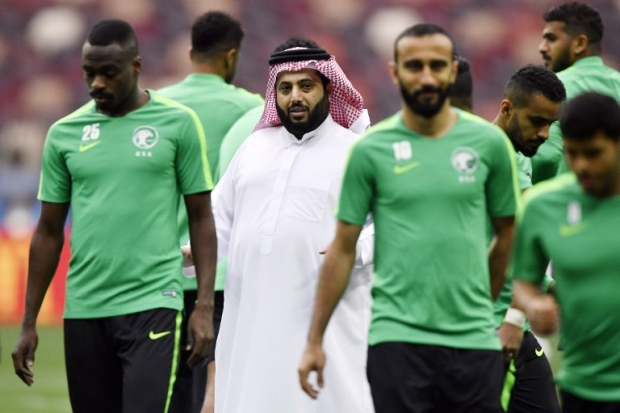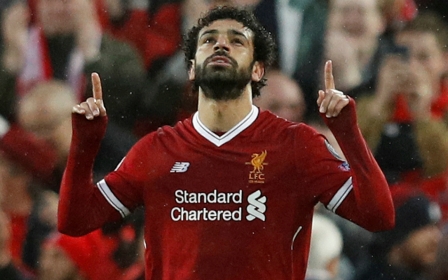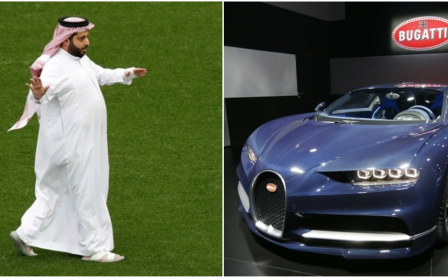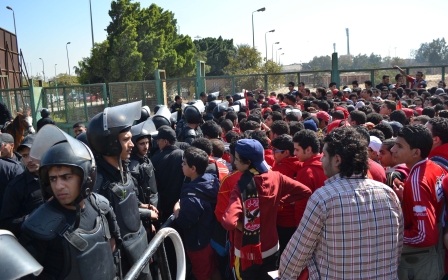Pyramids FC: Saudi ownership of Cairo club angers Egyptian football fans
Egyptian football fans accustomed to the traditional dominance of Al-Ahly and Zamalek have been bewildered by the sudden rise of a new Cairo-based club, Pyramids FC, who are sweeping all before them under the controversial ownership of Saudi minister Turki al-Sheikh.
Pyramids, who currently top the Egyptian Premier League, were known as Al Assiouty and based hundreds of kilometres south of Cairo in the city of Beni Suef before Sheikh, who heads Saudi Arabia's General Sports Authority and effectively serves as the Gulf kingdom's minister of sport, bought the club in June.
He immediately rebranded the team, moved it to the capital and embarked on a spending spree that has brought a cluster of Brazilian players and established Egyptian stars such as Ali Gabr, Omar Gaber, and Ahmed El-Shenawy to the club - with immediate results on the pitch.
He also set up a TV channel, Pyramids TV, with a budget large enough to hire some of the country's best known pundits and former players such as Mido, Khaled El-Ghandour and Ibrahim Hassan, as well as global names such as Ronaldinho and Roberto Carlos.
New MEE newsletter: Jerusalem Dispatch
Sign up to get the latest insights and analysis on Israel-Palestine, alongside Turkey Unpacked and other MEE newsletters
But concern is growing among fans that the 37-year-old Sheikh's influence may not be limited to establishing Pyramids as the best-resourced club in African football. When the owner complained of bias against his team and made a televised appeal to Egyptian President Abdel-Fattah el-Sisi for the introduction of foreign referees, league officials seemingly heeded his call.
Sheikh had accused Egyptian match officials of bias in Pyramids' 1-1 draw with El Gouna on 12 September and threatened to withdraw the club from the league if his demand for foreign referees was not met.
His comments were condemned by the Egyptian Football Association, which rejected suggestions of bias among its match officials, as it had done on previous occasions when other club chairmen had made similar remarks.
So when a Tunisian referee walked out of the tunnel to take charge of Pyramids' next match, a 1-0 win over El Mokawloon FC the reaction was a predictable uproar.
Farag Amer, the president of Semouha club, which had asked the EFA to provide foreign officials to referee last season's Egyptian cup final, accused it of "double standards".
But it was Mokawloon coach Alaa Nabeel's post-match rant in a television interview that caught the attention of Egyptian social media.
Nabeel, who also serves as assistant coach to the national football team, expressed his surprise at how quickly foreign referees had been hired, and compared the situation to Morgan Ahmed Morgan, a popular Egyptian comedy film in which a wealthy businessman who thinks he can buy anything bribes a football referee.
Translation: [Turki al-Sheikh] is now called Morgan Ahmed Morgan. The video was deleted by the channel after Al-Sheikh attacked it.
The statement was quickly picked up by Egyptians on social media who turned it into a viral hashtag that was used to discuss Turki al-Sheikh’s influence.
Translation: Alaa Nabeel summarised it in one sentence: “It’s the Morgan Ahmed Morgan League.” Do you think he will continue [as club manager] or will investors have other opinions? You [the EFA] have made us hate the thing we love, [football].
Nabeel had more to say in the interview following the match: “We have been slapped [in our faces] for a while in Egypt. We are Egyptians and have dignity. What is happening?“
The Egyptian manager expressed his surprise that “within 12 hours” of an EFA meeting following Sheikh’s remarks, four Tunisian referees had arrived at Mokawloon's stadium for the Pyramids match. He also pointed out that only four match officials were present for the match, despite EFA rules requiring a team of five or six.
Sheikh, who frequently posts on Facebook, was quick to respond: “If the Mokawloon manager has insulted me, there are authorities in Egypt that do not accept insults. They can teach him manners.”
The next day, the EFA announced penalties against Mokawloon, including suspending Nabeel for two matches over his comments.
The EFA also said it would start using VAR (Video Assistant Referee) technology, which was used during the World Cup but is still not commonly in use in Europe's main competitions, during the current season - something else that Sheikh had also recently called for.
The Saudi's involvement in Egyptian football began only last December when he was appointed as an honorary president of al-Ahly, Egypt's most popular team and the most successful club in Africa, in recognition of his fundraising efforts in support of current club chairman Mahmoud al-Khateeb's election campaign.
In just five months in the post, Sheikh said he spent 260m Egyptian pounds ($14.5m), but he stepped down in May after falling out with club officials.
It was after leaving al-Ahly that Sheikh bought Al Assiouty and the club's transformation into Pyramids FC began.
The Saudi's role has divided public opinion in Egypt between those who welcome private clubs as a business model that has succeeded internationally and those who suspect a Saudi-backed agenda to dominate African football and to undermine al-Ahly's status as the continent's most powerful club.
Mostafa al-Fakharany, a Zamalek fan and a football commentator, said that the rise of Pyramids FC reflected a wider dilemma in Egyptian football: “We either have clubs with money and no fans, or popular clubs with fans but no money.”
Omar Aboelnaga, a sports analyst and football fan, said that money alone was not enough to create a successful footballing culture.
"Developing Egyptian football will not be achieved by multi-million contracts with foreign players," he told Middle East Eye.
“If you really want to develop football, you need to build the infrastructure and to invest in young Egyptian footballers," he said.
The Saudi league, for example, has money, but remains weak, he said.
"Sheikh has unlimited funding. If he wanted to develop Egyptian football, he would have invested in the popular Assiouty club which had its fan base in upper Egypt. Why move to Cairo? Cairo already has al-Ahly and Zamalek."
In Egypt, most football clubs are state-sponsored. Privatisation of clubs would be one solution for smaller clubs that suffer discrimination in funding, said Aboelnaga.
But, without privatising other clubs, Pyramids have exacerbated the financial disparity within the sport, he added.
Ahmed Saad, an Egyptian sports journalist, said Sheikh’s investment in Pyramids FC raised “a big question mark".
Saad said that the current economic climate in Egypt, in which the pound is losing value against the US dollar and inflation is rising, meant that the country was not currently an attractive option for foreign investors, and speculated whether the goals of the Pyramids project went far beyond Saudi investment in the sports sector.
Saudi Arabia has been a key backer of Sisi's government since the former general seized power in a coup against Mohamed Morsi in 2013, with Cairo's controversial ceding of sovereignty to Riyadh over the Red Sea islands of Tiran and Sanafir last year offering further evidence of the close ties between the two governments.
“If we look at the Saudi backing for the current Egyptian rulers and Egypt’s transfer of two Red Sea islands to Egypt, it is fair to assume that investing in Pyramids could have a political aspect that only time will show,” Saad told MEE.
MEE contacted the Saudi Sports Authority to request comment from Sheikh but had not received a response at the time of publication.
Middle East Eye delivers independent and unrivalled coverage and analysis of the Middle East, North Africa and beyond. To learn more about republishing this content and the associated fees, please fill out this form. More about MEE can be found here.


